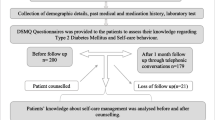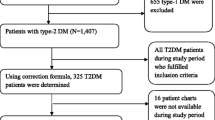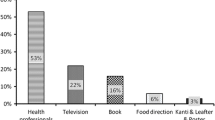Abstract
Introduction
The prevalence of diabetes mellitus is rapidly increasing particularly in developing countries. The aim of this study was to assess the knowledge and self-care practices of diabetes patients and to assess the contribution of the education to this knowledge level and glycemic control.
Methods
We formed patient groups consisting of 15–30 diabetic patients. First, patients were surveyed using a diabetes self-care knowledge questionnaire (DSCKQ-30). Sunsequently, a standard PowerPoint presentation about diabetes self-management was made to the patients who were then surveyed again using DSCKQ-30. All patients were invited to hospital to measure their control glycated hemoglobin (HbA1c) level 3 months later.
Results
Of the total 364 participants, 62.9% were females. Significant increases in the percentage of correct responses were determined in all components between, before and after education. There was a significant decline of 1.1 in HbA1c levels after 3 months of education. Married or active working patients had a better understanding of the education about diabetes and had a greater knowledge of self-care management regardless of their level of education or income.
Conclusion
Education about diabetes can significantly improve knowledge of self-care management and can help in achieving glycemic control. Continuing education about self-care management and complications is crucial and this should be accompanied by a regular assessment of pateients’ diabetic knowledge.
Similar content being viewed by others
References
Shaw JE, Sicree RA, Zimmet PZ. Global estimates of the prevalence of diabetes for 2010 and 2030. Diabetes Res Clin Pract. 2010;87(1):4–14.
Wild S, Roglic G, Green A, Sicree R, King H. Global prevalence of diabetes: estimates for the year 2000 and projections for 2030. Diabetes Care. 2004;27(5):1047–53.
Satman I, Omer B, Tutuncu Y, et al. Twelve-year trends in the prevalence and risk factors of diabetes and prediabetes in Turkish adults. Eur J Epidemiol. 2013;28(2):169–80.
King H, Aubert RE, Herman WH. Global burden of Diabetes, 1995–2025. Diabetes Care. 1998;21(9):1414–31.
Roglic G, Unwin N, Bennett PH, et al. The burden of mortality attributable to diabetes: realistic estimates for the year 2000. Diabetes Care. 2005;28(9):2130–5.
Jones H, Edwards L, Vallis TM, et al. Changes in diabetes self-care behaviors make a difference in glycemic control: the Diabetes Stages of Change (DiSC) study. Diabetes Care. 2003;26(3):732–7.
Wynn Nyunt S, Howteerakul N, Suwannapong N, Rajatanun T. Self-efficacy, self-care behaviors and glycemic control among type-2 diabetes patients attending two private clinics in Yangon, Myanmar. Southeast Asian J Trop Med Public Health. 2010;41(4):943–51.
Ciechanowski P, Russo J, Katon W, et al. Influence of patient attachment style on self-care and outcomes in diabetes. Psychosom Med. 2004;66(5):720–8.
Norris SL, Nichols PJ, Caspersen CJ, et al. Increasing diabetes selfmanagement education in community settings. A systematic review. Am J Prev Med. 2002;22(4):39–66.
Ellis SE, Speroff T, Dittus RS, Brown A, Pichert JW, Elasy TA. Diabetes patient education: a meta-analysis and meta-regression. Patient Educ Couns. 2004;52(1):97–105.
Davies MJ, Heller S, Skinner TC, et al. Effectiveness of the diabetes education and self management for ongoing and newly diagnosed (DESMOND) programme for people with newly diagnosed type 2 diabetes: cluster randomised controlled trial. BMJ. 2008;336(7642):491–5.
Adibe MO, Aguwa CN, Ukwe CV. The construct validity of an instrument for measuring type 2 diabetes self-care knowledge in Nigeria. Trop J Pharm Res. 2011;10(5):619–29.
Kaiser A, Vollenweider P, Waeber G, Marques-Vidal P. Prevalence, awareness and treatment of type 2 diabetes mellitus in Switzerland: the CoLaus study. Diabet Med. 2012;29:190–7.
Adisa R, Fakeye TO, Fasanmade A. Medication adherence among ambulatory patients with type 2 diabetes in a tertiary healthcare setting in southwestern Nigeria. Pharm Pract (Granada). 2011;9(2):72–81.
Ekpenyong CE, Akpan UP, Ibu JO, Nyebuk DE. Gender and age specific prevalence and associated risk factors of type 2 diabetes mellitus in Uyo metropolis, south eastern Nigeria. Diabetol Croat. 2012;41(1):17–28.
Adebisi SA, Oghagbon K, Jimoh AK, Akande T, Olarinoye JK. Quality of diabetic care in a tertiary health care facility in Ilorin. Nigeria. Diabetol Croat. 2009;31(2):38–42.
Shah VN, Kamdar PK, Shah N. Assessing the knowledge, attitudes and practice of type 2 diabetes among patients of Saurashtra region, Gujarat. Int J Diabetes Dev Ctries. 2009;29:118–22.
Mencing C, Boucher J, Cypress M. National standards for diabetes self-management education. Diabetes Care. 2006;29(1):78–85.
Al-Maskari F, El-Sadig M, Al-Kaabi JM, et al. Knowledge, attitude and practices of diabetic patients in the United Arab Emirates. PLoS ONE. 2013;8(1):e52857.
Kamel NM, Badawy YA, El-Zeiny NA, Merdan IA. Sociodemographic determinants of management behaviour of diabetic patients. Part I. Behaviour of patients in relation to management of their disease. East Mediterr Health J. 1999;5(5):967–73.
Kiberenge MW, Ndegwa ZM, Njenga EW, Muchemi EW. Knowledge, attitude and practices related to diabetes among community members in four provinces in Kenya: a cross-sectional study. Pan Afr Med J. 2010;7:2.
Demaio AR, Otgontuya D, de Courten M, et al. Exploring knowledge, attitudes and practices related to diabetes in Mongolia: a national populationbased survey. BMC Public Health. 2013;13:236.
Alele FO, Ilesanmi OS. Knowledge and attitude of a semi urban community in the south-south region of Nigeria towards diabetes mellitus. Am J Public Health Res. 2014;2(3):81–5.
Mohan D, Raj D, Shanthirani C, et al. Awareness and knowledge of diabetes in Chennai—the Chennai urban rural epidemiology study. J Assoc Phys India. 2005;53:283–7.
Islam FM, Chakrabarti R, Dirani M, et al. Knowledge, attitudes and practice of diabetes in rural Bangladesh: the Bangladesh Population Based Diabetes and Eye Study (BPDES). PLoS ONE. 2014;9(10):e110368.
Saleh F, Mumu SJ, Ara F, Begum HA, Ali L. Knowledge and self-care practices regarding diabetes among newly diagnosed type 2 diabetics in Bangladesh: a cross-sectional study. BMC Public Health. 2012;12:1112.
Jackson IL, Adibe MO, Okonta MJ, Ukwe CV. Knowledge of self-care among type 2 diabetes patients in two states of Nigeria. Pharm Pract. 2014;12(3):404.
Toobert DJ, Hampson SE, Glasgow RW. The summary of diabetes self-care activity measure. Diabetes Care. 2000;23(7):943–50.
Thungathurthi S, Thungathurthi S, Kumar VG. self-care knowledge on diabetes among diabetic patients in Warangal region. Int J Life Sci Pharma Res. 2012;2(2):16–21.
Al-Qazaz HKh, Sulaiman SA, Hassali MA, et al. Diabetes knowledge, medication adherence and glycemic control among patients with type 2 diabetes. Int J Clin Pharm. 2011;33(6):1028–35.
Moodley LM, Rambiritch V. An assessment of the level of knowledge about diabetes mellitus among diabetic patients in a primary healthcare setting. SA Fam Pract. 2007;49(10):16.
Winkley K, Stahl D, Chamley M, et al. Low attendance at structured education for people with newly diagnosed type 2 diabetes: General practice characteristics and individual patient factors predict uptake. Patient Educ Couns. 2016;99(1):101–7.
Wolff K, Chambers L, Bumol S, et al. The PRIDE (partnership to improve diabetes education) Toolkit: development and evaluation of novel literacy and culturally sensitive diabetes education materials. Diabetes Educ. 2016;42(1):23–33.
Acknowledgments
No funding or sponsorship was received for this study or publication of this article. The authors would like to thank to diabetes education nurses, Hayriye Topak Beyaz, Gulsev Dirik and Semure Zengi for kind help and support. All authors had full access to all of the data in this study and take complete responsibility for the integrity of the data and the accuracy of the data analysis. All named authors meet the International Committee of Medical Journal Editors (ICMJE) criteria for authorship for this manuscript, take responsibility for the integrity of the work as a whole, and have given final approval for the version to be published.
Disclosures
Oğuzhan Sıtkı Dizdar, Ozen Oz Gul, Osman Baspinar, Soner Cander, Pınar Sisman, Baki Eker and Canan Ersoy have nothing to disclose.
Compliance with Ethics Guidelines
All procedures followed were in accordance with the ethical standards of the responsible committee on human experimentation (institutional and national) and with the Helsinki Declaration of 1964, as revised in 2013. Informed consent was obtained from all patients for being included in the study.
Ethical committe approval for this study was received from Uludag University Medical School.
Author information
Authors and Affiliations
Corresponding author
Additional information
Enhanced content
To view enhanced content for this article go to http://www.medengine.com/Redeem/E0E4F06070538F97.
Rights and permissions
About this article
Cite this article
Dizdar, O.S., Gul, O.O., Baspınar, O. et al. Assessment of Factors Related to the Understanding of Education and Knowledge of Self-Care among Patients with Diabetes Mellitus: A Cross-Sectional Prospective Study. Adv Ther 33, 1565–1578 (2016). https://doi.org/10.1007/s12325-016-0378-6
Received:
Published:
Issue Date:
DOI: https://doi.org/10.1007/s12325-016-0378-6




